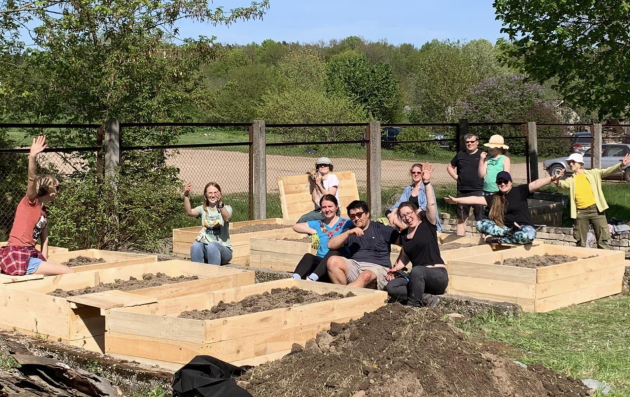Date of label : 29/10/2024

Group of people cultivating a vegetable garden.
Summary
The city of Vilnius (LT) identified over 20 communities that perform or would like to start climate-neutral activities. These activities included biodiversity projects, urban beekeeping, community gardens, managing wild fields, environmental education, repair and exchange practices, and food waste reduction. To support these activities, the city created a community network to function beyond the project's end. To foster the start of the activities, Vilnius city administration adopted a community support financial instrument, funded by the Municipal budget, prioritising climate-neutral activities. The aim was to establish an ongoing tradition, enabling communities to secure funding annually for their climate-neutral initiatives in the city.
The solutions offered by the Good Practice
Vilnius, known for its old trees and green spaces, has untapped potential for further green transformation, especially in its soviet-type block building districts. Adopting climate-neutral activities and community involvement is crucial for a greener, vibrant city.
After launching the Community financial support programme in March 2024, Vilnius received 45 applications, and 12 of those initiatives focused on climate-neutral activities were funded, each receiving up to EUR 5 000. These projects are distributed across Vilnius, with more than half being part of the COPE (Coherent place-based climate action) ULG (URBACT Local Group) network.
Key outcomes to date:
Community garden: Established on underused land, after a succesful collaboration between the ULG, municipality, and the landowner. With funding secured, 17 people built the basis of the new community garden in one day, including eight raised beds.
Community fridge: This climate-neutral initiative in Vilnius helps tackle food waste and provides food access to those in need.
Insect hotels: Over three COPE Local Groups built insect hotels in their neighbourhoods to attract pollinators, boost biodiversity, and educate the community about the importance of insects and their shelters.
Building on the sustainable and integrated urban approach
The concept of funding climate-neutral community ideas is seen as a way to pilot small-scale solutions and initiatives that could later be scaled up for city-wide policy implementation. It also builds partnerships and strengthens relationships with different citizen groups and communities. By directly involving these groups, the city can test ideas that support its goals and policies.
Based on participatory approach
Efforts to ensure equal access, social inclusion and diversity in the engagement of citizens and other stakeholders are embedded in legislation, which allows citizens to participate in official open hearings, discussions, and to form or join initiative groups. In some cases, efforts are done through project-based approaches (e.g. COPE).
Climate-neutral communities bring together various stakeholders, including NGOs, neighbourhood associations, schools, and small businesses. The city authorities and city-owned companies cooperate closely with these communities when implementing place-based climate-neutral initiatives, often providing land, tools, water, soil, and other resources.
Every spring, the city distributes plants to citizents and organises collaborative planting events in the selected neighbourhoods.
What difference has it made?
The most important goal of the city was to identify how many people care about the sustainable way of life in their own neighbourhoods, for example, what are their needs, and what kind of activities they would do to promote biodiversity and the circular economy.
This practise had a very successful start, and now the most important task is to make it an ongoing process. With good dissemination, and its involvement in the Green Capital programme in 2025, the city aims to expand the community network to deliver climate-neutral activities into the future.
Why this Good Practice should be transferred to other cities
In terms of policy relevant throught the EU, Vilnius’ good practice contributes to:
- Sustainable Development Goals (SDGs): SDG 15 (Life on land), by reversing land degradation, and halting biodiversity loss.
- The EU Green City Accord.
- Urban Agenda for the EU.
- Covenant of Mayors for Climate and Energy 2030.
The city has a general ambition to create project-based agendas, such as COPE. Related goals of the city are foreseen in the following documents:
- Vilnius City Master Plan since 2021.
- Vilnius Strategic Plan 2021-2030.
- Vilnius Sustainable Urban Mobility Plan (SUMP).
- Air Quality Management Programme and Action Plan 2020-2050.
- Environmental monitoring programme, since 2022.
City planning procedures prioritise citizen engagement from the earliest stages of planning green public spaces, with community input incorporated into subsequent planning phases. Through the city’s Neighbourhood Programme, communities can also initiate climate-neutral activities with municipal support, including greening solutions in inner yards of multi-dwelling housing neighbourhoods.
The practice is transferable to other EU cities. Vilnius shares details of the practise within the frameworks of EU programmes (URBACT, LIFE, H2020). In September 2024, the practice was presented at the ‘ACTION Conference: Presenting a Future Vision for Urban Agriculture’ in Brussels, and it will be further showcased during Vilnius’ year as European Green Capital in 2025.
